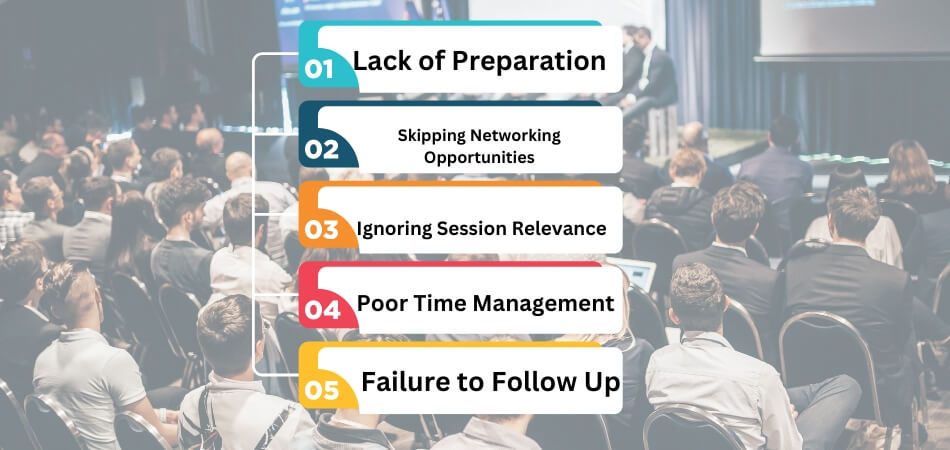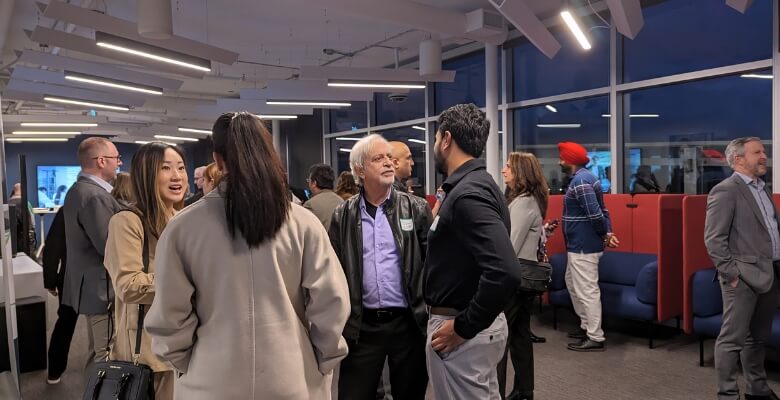A conference is a platform for experts, enthusiasts, and industry leaders to share insights and collaborate. Conferences provide invaluable professional growth opportunities. However, during this event, 5 biggest mistakes conference attendees make that significantly impact their overall experience and outcomes. The 5 biggest mistakes are:
Avoiding networking opportunities, such as interacting with fellow attendees and speakers, ignoring sessions irrelevant to career goals, poor time management resulting in missed sessions or events, and not following up with new contacts post-conference, can eliminate the valuable experience of attending a conference.
In this article, we are going to talk about common mistakes people make during conferences and how you can avoid these mistakes to maximize your conference experience and avoid these mistakes the next time you are at a conference.
Conference Vs Meeting: What’s the Difference?
A conference and a meeting, while similar in nature, serve different purposes and scales. A conference is typically a large, formal gathering focused on a specific industry or subject matter. It often includes multiple sessions, keynote speakers, and networking opportunities, especially in any academic and professional conferences, aiming to share knowledge, present research, and encourage professional connections. Conferences can last several days and attract attendees from various locations.

On the other hand, a meeting is usually a smaller, more intimate gathering with a specific agenda. Meetings are often shorter in duration, involving fewer participants who discuss specific issues, make decisions, or coordinate activities. Meetings can be formal or informal and are often held within an organization or between collaborating groups. While both conferences and meetings facilitate communication and collaboration, conferences are broader and more structured, whereas meetings are focused and direct.
Benefits of Attending a Conference
Taking part in conferences increases your professional growth, visibility, and motivation in your career path, from learning the latest insights to networking with industry leaders.
Learning Opportunities
By attending conferences, you gain insight into the latest research, trends, and innovations in your field through workshops, seminars, and presentations. Your professional skill set can be significantly improved with practical knowledge offered during these sessions, as they typically dive deep into practical applications.
Networking Opportunities
During the conference, you can network with peers, experts, potential collaborators, and mentors. Social events and networking sessions provide you with an excellent opportunity to expand your professional network. This interaction facilitates knowledge exchange, career advancement, and even business partnerships.
Professional Development
Taking part in conferences is essential for professional development. Aside from learning new skills, conferences offer specialized tracks and sessions for every career stage. From leadership workshops to technical skill-building sessions, these events provide targeted learning experiences directly relevant to your career growth.
Visibility and Recognition
Whether you’re presenting research findings, leading a panel discussion, or actively participating, conferences provide a platform to display your expertise and accomplishments. As a result, you gain credibility, build your professional reputation, and gain recognition among peers, employers, and stakeholders.
Inspiration and Motivation
A conference can provide a great deal of motivation and inspiration. Keynote speakers, industry leaders, and thought-provoking sessions can inspire new ideas, spark creativity, and renew your passion for your work. You can gain fresh perspectives and renew your passion for your career path if you hear success stories, overcome obstacles, and overcome challenges.
The real value of attending conferences lies not only in acquiring knowledge and skills, but also in making connections, gaining visibility, and staying inspired as you progress through your career.
5 Biggest Mistakes Conference Attendees Make
The experience of attending conferences can be a valuable opportunity for professional growth, but there are several common mistakes you should avoid. By understanding these mistakes, you can make the most of your next conference attendance.
Mistake 1: Lack of Preparation
Many attendees overlook the importance of preparation before the event. This includes not researching the agenda, speakers, and topics, which can lead to confusion and missed opportunities. It is essential to familiarize yourself with the schedule, identify key sessions, and set objectives for your conference experience.
A lack of preparation can also result in you not having necessary materials such as business cards or relevant notes, making it more difficult to engage effectively with others and make an impression.
Mistake 2: Skipping Networking Opportunities
Most attendees avoid social interaction at conferences, preferring to stick with familiar faces. Engaging with fellow attendees, speakers, and exhibitors can lead to collaborations, job opportunities, and valuable industry insights.
Furthermore, by skipping networking events and breaks, you reduce your chances of building relationships and exchanging ideas with your peers. Investing time in networking will help you expand your professional network and gain diverse perspectives that will benefit your career or business.
Mistake 3: Ignoring Session Relevance
The decision to participate in a session at random or without considering its relevance to your professional goals can result in the loss of valuable learning opportunities. Each session is designed to offer specific insights or skills relevant to your career growth.
Additionally, attending sessions that aren’t aligned with your interests can lead to boredom or a lack of engagement. Reviewing session descriptions and prioritizing those that align with your objectives ensures you gain maximum value from the conference.
Mistake 4: Poor Time Management
Missing key sessions at a conference, arriving late to important events, or feeling overwhelmed by a busy schedule can all be the result of poor time management during a conference. To ensure you can attend all the sessions and activities you’ve prioritized, you need to plan your day effectively, including breaks and travel time between sessions.
Ineffective time management leads to stress and confusion, which negatively affects your conference experience. By planning ahead, setting reminders, and allowing time for networking and relaxation, you can manage your time and maximize the benefits of your conference attendance.
Mistake 5: Failure to Follow Up
After a conference, it’s important to follow up with new contacts and apply what you learned. Sending personalized emails and connecting on professional platforms helps maintain relationships. Avoiding mistakes conference attendees make ensures you get the most from your experience.
The momentum gained from networking and learning can fade over time if you do not follow up after attending the conference. Maintaining the connections you made at the conference by sending personalized emails, connecting on professional platforms, or scheduling follow-up meetings demonstrates your commitment. Avoiding these common mistakes can significantly boost your conference experience and maximize the benefits of attending.
How Do You Measure the Success of Attending a Conference?
Your professional journey can be improved by attending conferences. They offer a unique platform to learn, network, and grow within your industry, providing opportunities to advance your career and expand your horizons.
Learning Opportunities
Through workshops, seminars, and presentations, you gain a thorough understanding of the latest research, trends, and innovations in your field by attending conferences. The conference organizer frequently selects sessions that offer actionable knowledge that can improve your professional skill set in a significant way.
Networking
As a result of conference networking sessions and social events, you can connect with peers, experts, potential collaborators, and mentors and expand your professional network. The interactions not only facilitate knowledge exchange but also create opportunities for collaborations, career advancements, and even business partnerships in the future.
Professional Development
Besides learning new skills, conferences offer specialized tracks and sessions that cater to a variety of career stages and interests, making it an integral part of ongoing professional development. The events provide targeted learning opportunities for your career growth, from leadership workshops to technical skill-building sessions.
Visibility and Recognition
During conferences, you can promote your expertise and accomplishments by presenting research findings, leading a panel discussion, or actively participating. Through this opportunity, you can strengthen your professional reputation, establish a reputation among peers, and gain recognition among stakeholders. Avoiding common mistakes like leaving a conference early ensures that you fully engage in these valuable experiences.
Inspiration and Motivation
You can get inspired and motivated by attending conferences. Keynote speakers, industry leaders, and thought-provoking sessions can help you come up with new ideas, spark creativity, and restore your passion for your job. It is possible to gain a fresh perspective and renew your enthusiasm about your career path by learning about success stories, overcoming challenges, and hearing about breakthroughs.
These valuable benefits highlight the value of attending conferences not only for acquiring knowledge and skills but also forging connections, increasing visibility, and staying inspired in your professional career.
How to Make the Most of Your Experience?
Making the most of your conference experience involves careful planning and active participation. It’s essential to approach the event with a strategic mindset to unlock its full potential. Here are some tips to enhance your experience and gain valuable insights.
- Set Clear Goals: Before the conference begins, identify specific objectives you want to achieve. This could include meeting certain people, attending particular sessions, or learning about new technologies relevant to your field.
- Research the Agenda: Familiarize yourself with the conference schedule and speakers in advance. This helps you prioritize sessions that align with your interests and ensures you don’t miss out on valuable presentations.
- Prepare Your Introduction Pitch: Having a concise intro pitch ready can facilitate introductions. Clearly explain who you are, what you do, and what you’re looking for, making networking smoother and more effective.
- Engage Actively: Participate in discussions and ask questions during sessions. Engaging actively not only deepens your understanding but also increases your visibility among peers and speakers, leading to meaningful connections.
- Network Strategically: Take advantage of networking events and informal gatherings. Connecting with fellow attendees can lead to potential collaborations and partnerships, expanding your professional network significantly.
- Take Notes: Document key takeaways from sessions and conversations. These notes will serve as a valuable resource for later reference and can help reinforce your learning experience.
- Be Open to New Experiences: Take advantage of the opportunity to meet different people and explore new ideas. Whether you’re attending a conference alone or with colleagues, being open-minded can bring unexpected benefits.
Using these tips can improve your conference experience and increase your learning and networking opportunities. Each event is a chance to grow personally and professionally, so engage fully and enjoy the journey.
FAQs About the 5 Biggest Mistakes Conference Attendees Make
Attending a conference can be a rewarding experience if you know what to expect and prepare well for it. Here are some frequently asked questions for conference attendees:
How Can I Make the Most of the Networking Opportunities at a Conference?
Networking is an important part of conferences, and you should plan how to approach people and who you’d like to connect with. Prepare a brief overview of yourself and your work as well. And don’t forget to follow up with the people you meet.
What Should I Do if I Can’t Attend All Sessions Due to Scheduling Conflicts?
If you can’t attend the entire conference, choose the sessions you’d like to attend and arrange to meet people before and after them. You can also connect with other attendees and speakers on social media, such as LinkedIn, to continue the conversation. Finally, consider taking part in virtual conferences if you can’t participate in person.
How Do I Prepare Effectively for Attending an International Conference?
Before the conference, research the speakers, the agenda, and topics. Prepare questions for the speakers, and bring business cards. Prepare for the language barrier by learning a few key phrases in your native language.
Is It Necessary to Present at a Conference to Benefit from Attending?
No, attending conferences offers valuable learning and networking opportunities even without presenting. Participate actively in sessions, discussions, and networking to gain insights and expand your professional circle.
How Can I Maximize My Learning from Conference Sessions and Workshops?
Take detailed notes during the workshop, and review the key points afterward. Seek out opportunities to network with speakers and other participants. Make sure to follow up on any leads or connections made during the conference.
Final Thought
The opportunities for professional growth provided by conferences are priceless, so avoiding the 5 biggest mistakes conference attendees make is crucial. A strategic approach to networking, preparation, and selecting sessions improves learning. Managing your time ensures you get the most out of every session.
Participants should avoid these mistakes if they want to gain recognition at conferences, gain recognition from sponsors, and build collaborations. You can maximize your impact by finding out, connecting, and showcasing expertise at each conference.







